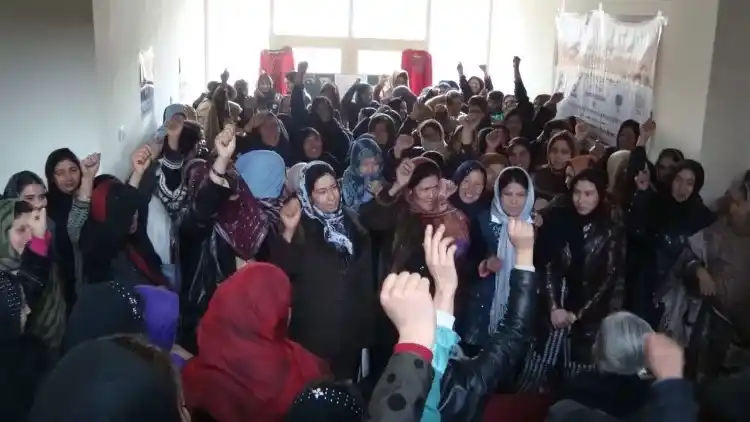
Neelam Gupta/New Delhi
On August 15, when the Taliban were entering Kabul to seal their victory in Afghanistan, six women were busy in an online meeting with the officials of the Ahmedabad-based NGO Self-Employed Women Association (SEWA), oblivious of the changes in the city and the country.
These Afghan women were the master trainers leading a program of skill development for women and organizing them into self-help groups. This association of skilled and financially independent women has grown into Afghanistan’s largest self-employed women’s association.
At the end of the thirteenth year of SEWA’s project, there is an army of 10,000 Afghan women running their business across the country.
Interestingly, at a time when everyone seems worried about the fate of India’s 3-billion-dollar investment in infrastructure projects in Afghanistan under the Taliban rule, this quiet social revolution in the country with the help of India’s most well-known social movement is little known to the world.
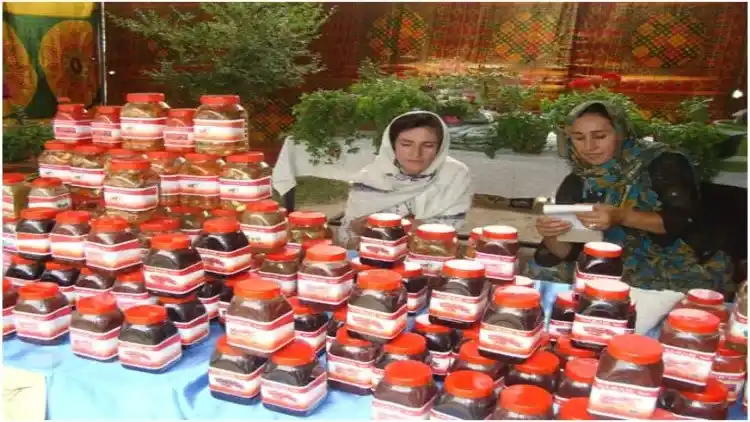
An Afghan women selliing jam made by women in Kabul
However, the next day, these women heard the news about President Ashraf Ghani quitting his position and leaving the country and the Taliban taking over, they were shocked.
They started reliving their experiences of the Taliban’s earlier rule - from 1996 to 2001-; it made them shudder to think of the future.
It’s important to know who these empowered Afghan women are. The 10,000 Afghan women who are members of the country’s biggest women’s alliance were once poor, widows and single house earners from capital Kabul, Kandahar and other provinces.
Their impoverishment was mostly due to the turmoil and the war that Afghanistan had faced since the Soviet invasion in 1989 and later when the local warlords hitting the USSR followed by the Taliban’s war on the invaders. The war left many widows, orphans and also pushed families into poverty.
The Taliban’s first rule made women cover their faces, vanish from public spaces and workplaces, stoning them to death. Since barring Pakistan, Saudi Arabia, and UAE, no country had relations with them the world watched the Taliban unleash the most inhuman treatment to women silently.
After the Taliban’s rout and the establishment of an elected government led by Hamid Karzai, life started changing for women. India and Afghanistan signed a memorandum of understanding in 2004 for mutual socio-economic cooperation.
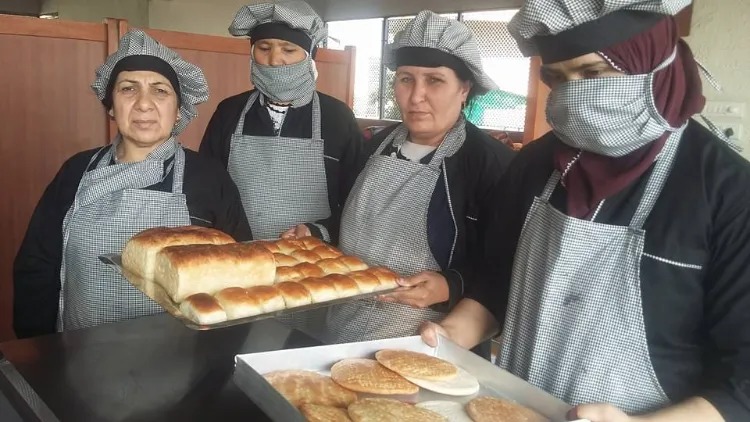 Kabul women getting trained at making Bakery items in Ahmedabad
Kabul women getting trained at making Bakery items in Ahmedabad
The SEWA founded by the Gandhian Elaben Bhatt that has made women workers cooperatives a force to reckon with and also given a self-sustaining model of the cooperative movement to the world while changing lives of lakhs of people in India, was approached by the Indian government for helping Afghan women.
SEWA’s senior co-ordinator Manisha Pandya says when they met these women in Kabul in 2007 for the first time, they looked terrified and were not optimistic about life and the future.
It took the SEWA team comprising Manisha Pandya, Pratibha Pandya and Megha Desai one year to boost their morale and emerge from the shadows of their past.
They explained how SEWA’s involvement with Afghanistan started with a letter it had received from Prime Minister’s office in 2006 asking it to help the Afghan women. Manisha Pandya, Pratibha Pandya, and Magha Desai, who were associated with SEWA’s Afghan initiative says they first did a survey in Afghanistan and zeroed in on three areas: embroidery, food preservation and processing and flower cultivation. They said that initially 35 women were selected and invited to Ahmedabad for a Train the Trainer program. These women went back to Kabul to start the work of mobilizing and training women.
In the first four years, a SEWA team would stay in Kabul for three months to be replaced by another with an overlapping phase of a few days to maintain continuity.
Motivating the women was the hardest part for SEWA as these women had barely come out of the shadows of an oppressive regime. “They faced a lot of problems; their families were hostile to their working outside the homes; the markets didn’t value their work and menfolk were forbidding them from moving out for training and association,” Manisha said.
SEWA officials started inviting their menfolk to the meetings and gradually conditions improved for the women. SEWA also spoke with retail businesses and markets to make sure they bought their products.
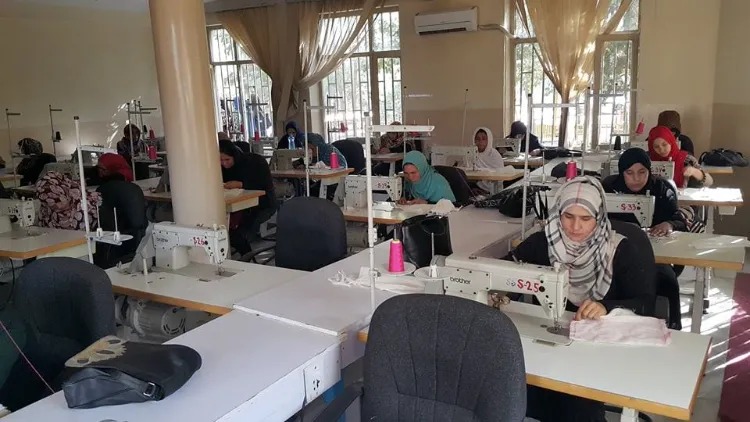
Afghan women making designer clothes in Kabul
Once, when a SEWA team was in Kabul there was a bomb scare in their office. A suicide bomber was supposed to target their center.
Soon the women started doing well, they set up a business center in Kabul, their stuff was in demand in the markets. They would also participate in exhibitions in India.
Thirteen years after the SEWA team landed in Kabul, the lives of these women had changed; their children were going to school; they were providing for their families and lived well.
Seeing this success story, the Afghan government asked SEWA to extend the program to far off provinces of Mazar-e-sharif, Herat, Kandahar, Baglan and Parwan.
Today there are 450 Afghan Master Trainers in Afghanistan to expand the network and yet the return of the Taliban has cast a shadow over the program. The SEWA team that interacted with Afghan women on August 15 said they looked confident and cheerful but the next day their countenance had changed. Having become financially independent, this time they are not ready to put up with the Taliban’s misogyny.
Shikiba of Kabul said, "After the Taliban were gone, SEWA made her strong and helped her rebuild her life. Today, when the Taliban is back, I believe we are strong enough to rebuild our lives in safer areas."
Sosan of Kabul said, “I wish for a safe passage out of Afghanistan. I am confident that in a new place, I will start work and stand on my own two feet and sustain my family. I fear for my safety, I fear for my family's well-being and need help."
Azizgul from Herat said, "Ever since the Taliban took over, women are not allowed to step outside their homes anymore. The situation is very bad as fear over rampant killings and gunshots. For us, the only way out is to get out of the country.”
Azizgul said their families also want them to leave the country. “They don’t want to see us pushed back into a life of oppression and suffering, " she told her SEWA counterparts in Ahmedabad.
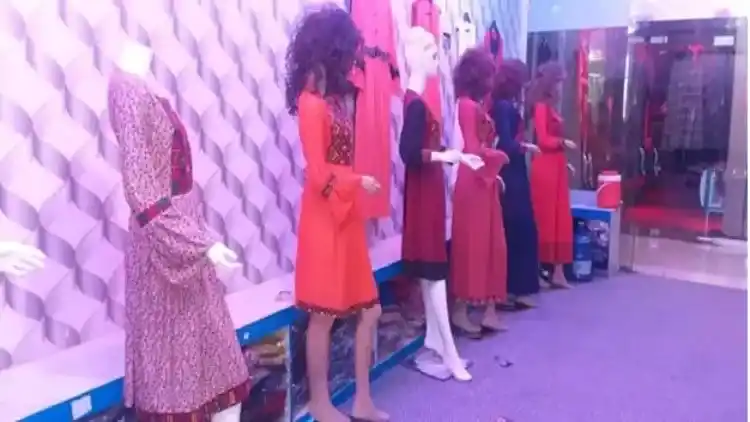
Garments made by Afghan women on display in a Kabul fashion store
Kabul-based Hafiza jan, executive committee member of Sabah Bagh-e-Khazana Social Association (SBKSA), sister organization of SEWA at Kabul, and master trainer of garment making team, says the recent developments brought back spine-spilling memories of her being knocked down by gun-wielding Taliban.
"That was 13 years ago. I survived and with the support of SEWA learned to stand on my own two feet, mastering the trade of garment making and earning for my family. After I heard that the Taliban has entered Dasht-e-Barchi in Kabul, I am worried for my and my mother’s safety.’ says Hafiza Jan. According to her "Taliban’s taking over reins of power in Afghanistan means she would no longer be allowed to work in the center, earn and buy food and medicines for her mother. It's not just me, millions of Afghan women will be subjected to extreme control and oppression."
Today there are 450 Master Trainers in Afghanistan to expand the network and yet the return of the Taliban has cast a shadow over the program.
SEWA officials in Ahmedabad say the Taliban’s return has changed the situation. The women from places other than Kabul are not in touch with them anymore.
They say it’s difficult to contact women even in Kabul due to poor network connectivity.
